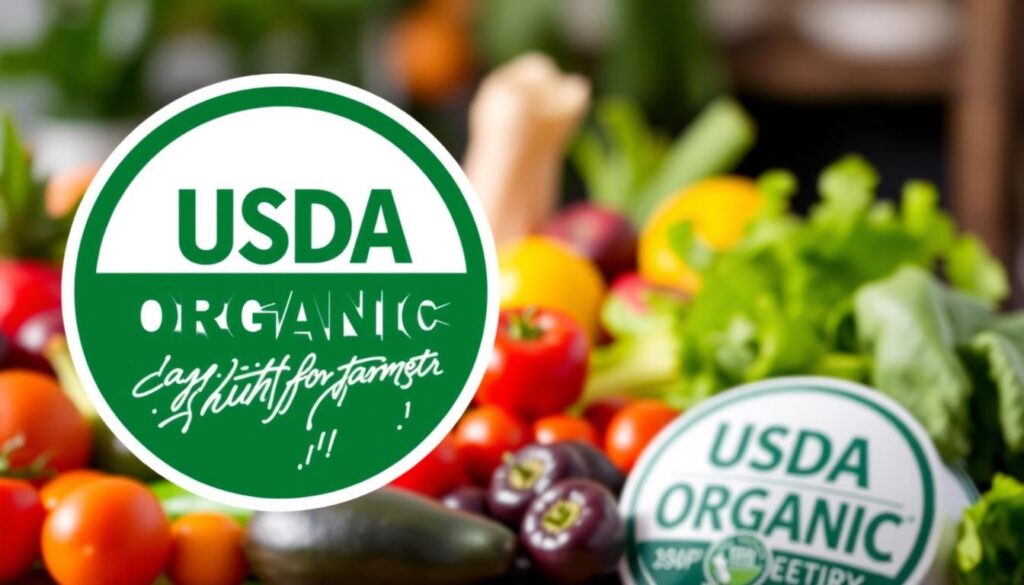Choosing to live organically is a great step towards better health and helping the environment. This lifestyle focuses on mindful choices, like picking products without harmful chemicals. By living this way, we improve our health and help the planet. This article will show you how to add organic habits to your life for a brighter, more earth-friendly future.

Seek App
Understanding Organic Food for a Healthy Diet
Organic food is key for a healthy diet. It uses farming that’s good for the earth and our health. People now see how organic food, with its fresh, chemical-free produce, is beneficial. Research shows organic fruits and veggies often have more nutrients, like vitamins and antioxidants, that keep us healthy.
Anúncios
The Benefits of Choosing Organic Produce
Adding organic produce to your meals gives many benefits, such as:
- Higher nutrient levels, which make your immune system stronger.
- Less exposure to harmful pesticides and chemicals.
- Better taste and freshness.
These benefits from organic food not only improve your health. They also support farming that is good for the earth.
Anúncios
Importance of the USDA Organic Seal
The USDA Organic Seal helps us trust in organic purchases. This certification means the food follows strict rules. With this seal, you know the food was made without harmful chemicals. This promise of quality assures us of a diet that’s safe and healthy.

Benefits of Embracing an Organic Lifestyle
Choosing an organic way of living can really improve your health. Organic foods are packed with more nutrients than regular foods. They have more vitamins, minerals, and good fats like omega-3s.
Nutrient Density of Organic Foods
Studies show that organic fruits and veggies are richer in key nutrients. They have more vitamins and minerals that help fight diseases. For example, organic tomatoes are loaded with vitamin C and antioxidants which boost your immune system.
Reduction of Chemical Exposure
Going organic helps reduce your body’s chemical load. Organic farming skips harmful pesticides and fertilizers. This means the food you eat has less bad stuff that could lead to allergies or hormonal problems. Choosing organic is a step towards a life with less exposure to dangerous chemicals.
How to Transition to Organic Living
Moving to an organic lifestyle might seem hard at first. But, small steps can lead to big, lasting changes. You can make the shift simpler and more fun by focusing. Start by switching one food group to organic. This gradually brings healthier choices into your life.
Start with One Food Group
Begin your journey by picking a specific food group. Consider these options:
- Dairy: Choose organic milk, cheese, and yogurt from trusted brands.
- Vegetables: Go for organic veggies, especially those usually sprayed with pesticides.
- Fruits: Select organic versions of your favorite fruits.
This approach lets you slowly adjust. It helps you form habits that fit your new organic lifestyle.
Budget-Friendly Organic Options
Adding organic foods to your meals doesn’t have to be expensive. Try these budget-friendly ideas:
- Shop directly from local farms or farmers’ markets for fresher, cheaper goods.
- Consider joining a Community-Supported Agriculture (CSA) program for affordable seasonal produce.
- Look out for sales on organic items at your grocery store, or buy in bulk.
With these tips, you can move to organic living without hurting your wallet.
Exploring Local and Seasonal Organic Produce
Choosing local organic produce helps both your health and the planet. By joining a Community-Supported Agriculture (CSA) group, you get fresh food directly from nearby farms. This method boosts the value of fresh ingredients and connects consumers with where their food comes from.
Support Community-Supported Agriculture (CSA)
Community-Supported Agriculture lets people directly support local farms. By becoming members, they get a portion of the farm’s harvest all season. It’s a great method to enjoy fresh food, support local farmers, and promote sustainable farming. It also cuts down on the carbon footprint caused by long-distance food transport.
Freshness and Flavor of Local Food
Local organic produce is super fresh, often picked just hours before you get it. This means better taste and more nutrients. When food is in season and picked at its peak, it’s more delicious and good for you. Buying from local farmers makes us value our food more and encourages a healthy, community-based lifestyle.
Greening Your Home with Organic Choices
Living an organic life means more than just what you eat. It’s about making your home greener too. Choosing household items wisely can better your health and help the planet. Products that are kind to the earth and natural fabrics are key to a sustainable home. They keep you healthy and lower your contact with bad chemicals.
Choosing Eco-Friendly Household Products
Picking products that are friendly to the environment means avoiding toxic chemicals. This can make the air in your home cleaner and safer to breathe. Things to consider include:
- Biodegradable cleaning agents
- Recycled paper products
- Natural pest repellents
Look for certifications like Green Seal or EcoLogo when you shop. These marks help you know the products are safe for the environment.
Organic Textiles and Sustainable Living
Adding organic textiles in your home is an easy step towards a greener life. Using bedding and clothes made from organic cotton or linen feels great and is better for the Earth. Always check for labels like GOTS (Global Organic Textile Standard) to be sure of their quality. Sustainable home textiles also offer:
- Non-toxic dye options
- Durable, eco-friendly materials
- Ethical manufacturing practices
By choosing organic materials, you take care of your health and the planet too.
DIY Organic Cleaning Solutions for Your Home
Making your DIY cleaning solutions is a great way to keep your home clean, healthy, and eco-friendly. Using organic options helps avoid harmful synthetic chemicals found in store-bought products. Vinegar, baking soda, and essential oils are key items. They are powerful cleaners for many household chores.
DIY cleaning methods are not only affordable but also customizable. You can pick your favorite scents and decide how strong you want your cleaners. Vinegar freshens up surfaces, and baking soda scrubs away dirt. Essential oils add a nice smell and fight germs too.
Creating your own cleaners can be a fun and sustainable project. It’s a way for families to work together and build eco-friendly habits. Making organic cleaning solutions is an easy step to keeping your home spotless. And it helps you live according to your values.
The Importance of Organic Skin Care Products
The skin is our largest organ and soaks up a lot of what we put on it. Using organic skincare products can really help improve skin health. Leave-on products like moisturizers and serums stick to your skin longer. This lets their active ingredients work deeply and keep your skin nourished and hydrated for a long time.
Choosing Leave-On Versus Rinse-Off Products
For the best results from your skincare, leave-on products are key. On the other hand, rinse-off products, like cleansers, have a different job. The main differences are:
- Absorption: Leave-on products give your skin more time to soak up the good stuff, making them more effective.
- Hydration: These keep your skin moist all day.
- Targeted Treatment: Many leave-on products are made to tackle specific skin issues, like dryness or aging signs.
Benefits of Artisan and Handmade Organic Skincare
Artisan beauty brands are known for their focus on quality and being eco-friendly. They often make their products by hand with organic, locally sourced ingredients. The perks of going with artisan skincare are:
- Quality Ingredients: They usually skip the synthetic stuff and harsh chemicals.
- Affordability: Artisan brands can offer top-notch quality without the big price tag.
- Sustainability: Smaller scale production means a smaller environmental footprint.
Choosing organic skincare is good for both you and the planet. Picking products from trusted artisan brands means you get quality and unique blends. These enhance your well-being and are kind to the earth.
Reduce, Reuse, Recycle: Practicing Sustainability
It’s important to follow sustainability to keep our environment healthy. By reducing, reusing, and recycling, we can greatly lower our impact on the planet. Making small changes to our daily routines can help us live more sustainably, by cutting down waste and saving resources.
Investing in Reusable Products
Using items like stainless steel bottles, cloth bags, and glass containers can cut down on trash. These products are not just useful, but they also inspire others to start using them. Choosing durable, reusable items helps create a sustainable culture and reduces our use of disposable products.
Understanding Local Recycling Guidelines
Knowing your area’s recycling rules is a key part of recycling effectively. When we learn what can be recycled locally, we avoid mistakes and make recycling work better. Every place has its own rules for recycling different materials. By following these rules, we help improve recycling in our community and support bigger environmental goals.
Engaging with Nature for Holistic Wellbeing
Connecting with nature is key to overall wellbeing. It boosts both our body and mind. It lifts our mood, cuts stress, and helps us feel part of a community.
Benefits of Outdoor Activities
Activities like hiking, biking, or gardening link us closely to nature. Let’s look at some benefits:
- Improved physical fitness through regular exercise.
- Increased exposure to sunlight, which is essential for vitamin D production.
- Enhanced mood and mental clarity from being immersed in nature.
Volunteer Opportunities at Organic Gardens
Volunteering at organic gardens encourages sustainable living and community interaction. You can meet others, work together, and improve wellbeing. It’s a chance to learn about sustainable farming and make new friends who care about the earth.
Conclusion
The journey to organic living is a continuous effort to choose actions that better our health and the planet. We’ve looked at different ways to add organic habits into what we eat, how we keep our homes, and the products we use on ourselves.
Even small changes can make a big difference in living healthier. Choosing organic food, using green cleaners, and being outside help our planet. Every little step helps do something bigger.
Keep making mindful choices as you live organically. By choosing what’s better for the environment, you improve your life and encourage others. You show the good in choosing an organic way of life.



